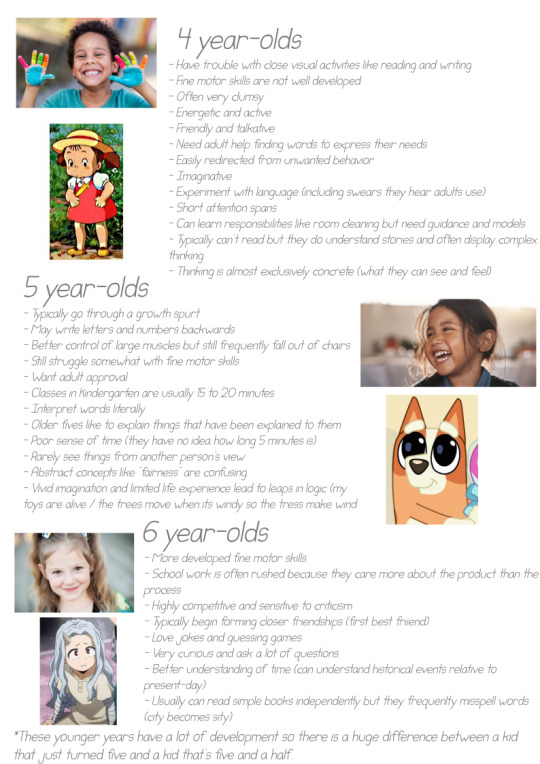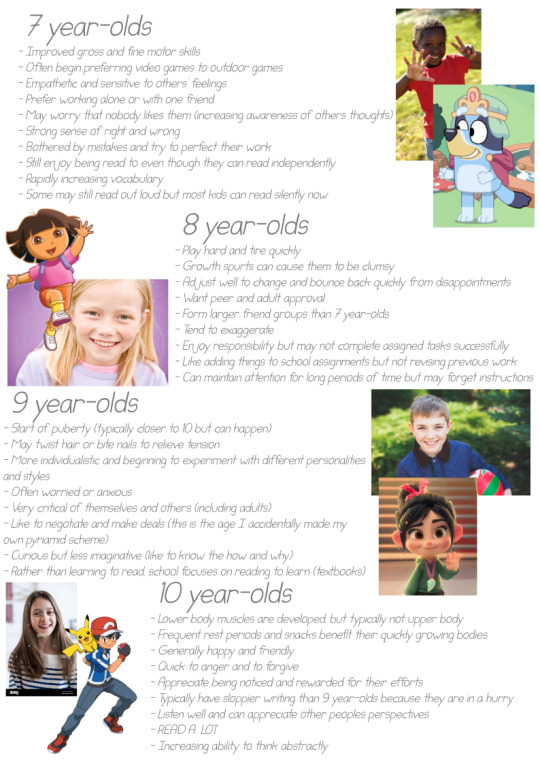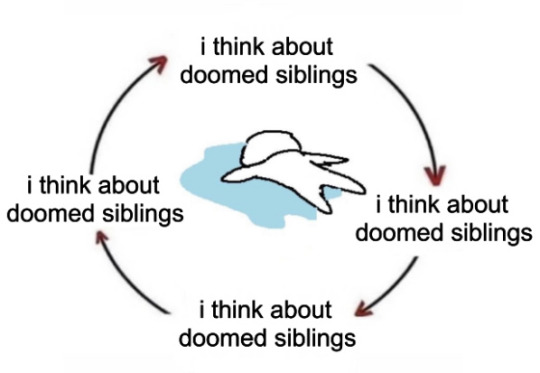Text
It's really hard to explain what I mean but yknow that moment in the show where the protagonist realises who is pulling all the strings and it all clicks into place. But it implicates their companion in the process? And they turn around to tell their companion about their revelation and the shot changes and you can just see the companion is already 5 steps ahead of them. They're got this knowing look and a smarmy smile on their face. And before the protagonist even gets to speak they have a silent moment of "we both know what we know." LITERALLY MY FAVOURITE TYPE OF VILLAIN REVEAL.
51K notes
·
View notes
Text
Worldbuilding tip for aspiring fantasy authors! Give that swordsman a bigger ass
16K notes
·
View notes
Text
if you’re white and wanna write a poc character and feel awkward about it i implore you to ignore any twitblr stuff treating it as a massive ethical burden and instead come in more with the same mindset you’d have if you wanted to write about idk firefighters but didn’t know anything about firefighters so you do... research. Like fuck off with the weird kinda creepy calls for spiritual introspection you’re not writing about god damn space aliens you’re writing about humans and if you think you need more perspective of different life experiences just read?
128K notes
·
View notes
Text
I am so sick of fic writers making 10-year-olds talk like babies.
I work with children and have taken numerous classes on adolescent development. Here's some of what I learned because I might actually kill someone if I read another fic where an older child is essentially a four-year-old. (No hate to anyone in particular. Children are confusing.)
(Slight trigger warning for 13 & 14 year-olds. Puberty/sex mentioned)



(Most info is from Chip Wood's Yardsticks: Child and Adolescent Development Ages 4-14)
1K notes
·
View notes
Text
Came back wrong? How about came back right, except that the world you came back to is wrong. Came back just like waking up from a long nap only to find that the people who love you broke themselves into shards and bloody bargains to get you back.
There are new stains that nobody will explain, hidden beneath the rug in the upstairs hallway. Your mother's left eye is clouded and strange. The cat no longer goes near your brother. There's a sharp-edged shadow now, under your lover's smile.
Everybody says you must be remembering wrong, but your sense of smell is just as good as ever. The closet that used to smell like cedar and cinnamon smells like sulfur, now, and nobody will tell you why.
32K notes
·
View notes
Text
Why do Goblins have to eat trash? Why can’t goblin cuisine simply have a strong emphasis on fermentation and controlled spoilage?
Like fermentation stinks to high heaven and you typically hide it away in dark and cool places. It fits lore wise for a creature that lives in a cave and is described as unclean.
Anyway this has been food for thought
33K notes
·
View notes
Text
What are some chronic illnesses that can only occur in a fantasy setting?
13K notes
·
View notes
Text
hi I'm from your pseudo-medieval fantasy city. yeah. you forgot to put farms around us. we have very impressive walls and stuff but everyone here is starving. the hero showed up here as part of his quest and we killed and ate him
31K notes
·
View notes
Text
A Guide to Historically Accurate Regency-Era Names

I recently received a message from a historical romance writer asking if I knew any good resources for finding historically accurate Regency-era names for their characters.
Not knowing any off the top of my head, I dug around online a bit and found there really isn’t much out there. The vast majority of search results were Buzzfeed-style listicles which range from accurate-adjacent to really, really, really bad.
I did find a few blog posts with fairly decent name lists, but noticed that even these have very little indication as to each name’s relative popularity as those statistical breakdowns really don't exist.
I began writing up a response with this information, but then I (being a research addict who was currently snowed in after a blizzard) thought hey - if there aren’t any good resources out there why not make one myself?
As I lacked any compiled data to work from, I had to do my own data wrangling on this project. Due to this fact, I limited the scope to what I thought would be the most useful for writers who focus on this era, namely - people of a marriageable age living in the wealthiest areas of London.
So with this in mind - I went through period records and compiled the names of 25,000 couples who were married in the City of Westminster (which includes Mayfair, St. James and Hyde Park) between 1804 to 1821.
So let’s see what all that data tells us…
To begin - I think it’s hard for us in the modern world with our wide and varied abundance of first names to conceive of just how POPULAR popular names of the past were.
If you were to take a modern sample of 25-year-old (born in 1998) American women, the most common name would be Emily with 1.35% of the total population. If you were to add the next four most popular names (Hannah, Samantha, Sarah and Ashley) these top five names would bring you to 5.5% of the total population. (source: Social Security Administration)
If you were to do the same survey in Regency London - the most common name would be Mary with 19.2% of the population. Add the next four most popular names (Elizabeth, Ann, Sarah and Jane) and with just 5 names you would have covered 62% of all women.
To hit 62% of the population in the modern survey it would take the top 400 names.
The top five Regency men’s names (John, William, Thomas, James and George) have nearly identical statistics as the women’s names.
I struggled for the better part of a week with how to present my findings, as a big list in alphabetical order really fails to get across the popularity factor and also isn’t the most tumblr-compatible format. And then my YouTube homepage recommended a random video of someone ranking all the books they’d read last year - and so I present…
The Regency Name Popularity Tier List
The Tiers
S+ - 10% of the population or greater. There is no modern equivalent to this level of popularity. 52% of the population had one of these 7 names.
S - 2-10%. There is still no modern equivalent to this level of popularity. Names in this percentage range in the past have included Mary and William in the 1880s and Jennifer in the late 1970s (topped out at 4%).
A - 1-2%. The top five modern names usually fall in this range. Kids with these names would probably include their last initial in class to avoid confusion. (1998 examples: Emily, Sarah, Ashley, Michael, Christopher, Brandon.)
B - .3-1%. Very common names. Would fall in the top 50 modern names. You would most likely know at least 1 person with these names. (1998 examples: Jessica, Megan, Allison, Justin, Ryan, Eric)
C - .17-.3%. Common names. Would fall in the modern top 100. You would probably know someone with these names, or at least know of them. (1998 examples: Chloe, Grace, Vanessa, Sean, Spencer, Seth)
D - .06-.17%. Less common names. In the modern top 250. You may not personally know someone with these names, but you’re aware of them. (1998 examples: Faith, Cassidy, Summer, Griffin, Dustin, Colby)
E - .02-.06%. Uncommon names. You’re aware these are names, but they are not common. Unusual enough they may be remarked upon. (1998 examples: Calista, Skye, Precious, Fabian, Justice, Lorenzo)
F - .01-.02%. Rare names. You may have heard of these names, but you probably don’t know anyone with one. Extremely unusual, and would likely be remarked upon. (1998 examples: Emerald, Lourdes, Serenity, Dario, Tavian, Adonis)
G - Very rare names. There are only a handful of people with these names in the entire country. You’ve never met anyone with this name.
H - Virtually non-existent. Names that theoretically could have existed in the Regency period (their original source pre-dates the early 19th century) but I found fewer than five (and often no) period examples of them being used in Regency England. (Example names taken from romance novels and online Regency name lists.)
Just to once again reinforce how POPULAR popular names were before we get to the tier lists - statistically, in a ballroom of 100 people in Regency London: 80 would have names from tiers S+/S. An additional 15 people would have names from tiers A/B and C. 4 of the remaining 5 would have names from D/E. Only one would have a name from below tier E.
Women's Names
S+ Mary, Elizabeth, Ann, Sarah
S - Jane, Mary Ann+, Hannah, Susannah, Margaret, Catherine, Martha, Charlotte, Maria
A - Frances, Harriet, Sophia, Eleanor, Rebecca
B - Alice, Amelia, Bridget~, Caroline, Eliza, Esther, Isabella, Louisa, Lucy, Lydia, Phoebe, Rachel, Susan
C - Ellen, Fanny*, Grace, Henrietta, Hester, Jemima, Matilda, Priscilla
D - Abigail, Agnes, Amy, Augusta, Barbara, Betsy*, Betty*, Cecilia, Christiana, Clarissa, Deborah, Diana, Dinah, Dorothy, Emily, Emma, Georgiana, Helen, Janet^, Joanna, Johanna, Judith, Julia, Kezia, Kitty*, Letitia, Nancy*, Ruth, Winifred>
E - Arabella, Celia, Charity, Clara, Cordelia, Dorcas, Eve, Georgina, Honor, Honora, Jennet^, Jessie*^, Joan, Joyce, Juliana, Juliet, Lavinia, Leah, Margery, Marian, Marianne, Marie, Mercy, Miriam, Naomi, Patience, Penelope, Philadelphia, Phillis, Prudence, Rhoda, Rosanna, Rose, Rosetta, Rosina, Sabina, Selina, Sylvia, Theodosia, Theresa
F - (selected) Alicia, Bethia, Euphemia, Frederica, Helena, Leonora, Mariana, Millicent, Mirah, Olivia, Philippa, Rosamund, Sybella, Tabitha, Temperance, Theophila, Thomasin, Tryphena, Ursula, Virtue, Wilhelmina
G - (selected) Adelaide, Alethia, Angelina, Cassandra, Cherry, Constance, Delilah, Dorinda, Drusilla, Eva, Happy, Jessica, Josephine, Laura, Minerva, Octavia, Parthenia, Theodora, Violet, Zipporah
H - Alberta, Alexandra, Amber, Ashley, Calliope, Calpurnia, Chloe, Cressida, Cynthia, Daisy, Daphne, Elaine, Eloise, Estella, Lilian, Lilias, Francesca, Gabriella, Genevieve, Gwendoline, Hermione, Hyacinth, Inez, Iris, Kathleen, Madeline, Maude, Melody, Portia, Seabright, Seraphina, Sienna, Verity
Men's Names
S+ John, William, Thomas
S - James, George, Joseph, Richard, Robert, Charles, Henry, Edward, Samuel
A - Benjamin, (Mother’s/Grandmother’s maiden name used as first name)#
B - Alexander^, Andrew, Daniel, David, Edmund, Francis, Frederick, Isaac, Matthew, Michael, Patrick~, Peter, Philip, Stephen, Timothy
C - Abraham, Anthony, Christopher, Hugh>, Jeremiah, Jonathan, Nathaniel, Walter
D - Adam, Arthur, Bartholomew, Cornelius, Dennis, Evan>, Jacob, Job, Josiah, Joshua, Lawrence, Lewis, Luke, Mark, Martin, Moses, Nicholas, Owen>, Paul, Ralph, Simon
E - Aaron, Alfred, Allen, Ambrose, Amos, Archibald, Augustin, Augustus, Barnard, Barney, Bernard, Bryan, Caleb, Christian, Clement, Colin, Duncan^, Ebenezer, Edwin, Emanuel, Felix, Gabriel, Gerard, Gilbert, Giles, Griffith, Harry*, Herbert, Humphrey, Israel, Jabez, Jesse, Joel, Jonas, Lancelot, Matthias, Maurice, Miles, Oliver, Rees, Reuben, Roger, Rowland, Solomon, Theophilus, Valentine, Zachariah
F - (selected) Abel, Barnabus, Benedict, Connor, Elijah, Ernest, Gideon, Godfrey, Gregory, Hector, Horace, Horatio, Isaiah, Jasper, Levi, Marmaduke, Noah, Percival, Shadrach, Vincent
G - (selected) Albion, Darius, Christmas, Cleophas, Enoch, Ethelbert, Gavin, Griffin, Hercules, Hugo, Innocent, Justin, Maximilian, Methuselah, Peregrine, Phineas, Roland, Sebastian, Sylvester, Theodore, Titus, Zephaniah
H - Albinus, Americus, Cassian, Dominic, Eric, Milo, Rollo, Trevor, Tristan, Waldo, Xavier
& Men were sometimes given a family surname (most often their mother's or grandmother's maiden name) as their first name - the most famous example of this being Fitzwilliam Darcy. If you were to combine all surname-based first names as a single 'name' this is where the practice would rank.
*Rank as a given name, not a nickname
+If you count Mary Ann as a separate name from Mary - Mary would remain in S+ even without the Mary Anns included
~Primarily used by people of Irish descent
^Primarily used by people of Scottish descent
>Primarily used by people of Welsh descent
I was going to continue on and write about why Regency-era first names were so uniform, discuss historically accurate surnames, nicknames, and include a little guide to finding 'unique' names that are still historically accurate - but this post is already very, very long, so that will have to wait for a later date.
If anyone has any questions/comments/clarifications in the meantime feel free to message me.
Methodology notes: All data is from marriage records covering six parishes in the City of Westminster between 1804 and 1821. The total sample size was 50,950 individuals.
I chose marriage records rather than births/baptisms as I wanted to focus on individuals who were adults during the Regency era rather than newborns. I think many people make the mistake when researching historical names by using baby name data for the year their story takes place rather than 20 to 30 years prior, and I wanted to avoid that. If you are writing a story that takes place in 1930 you don’t want to research the top names for 1930, you need to be looking at 1910 or earlier if you are naming adult characters.
I combined (for my own sanity) names that are pronounced identically but have minor spelling differences: i.e. the data for Catherine also includes Catharines and Katherines, Susannah includes Susannas, Phoebe includes Phebes, etc.
The compound 'Mother's/Grandmother's maiden name used as first name' designation is an educated guesstimate based on what I recognized as known surnames, as I do not hate myself enough to go through 25,000+ individuals and confirm their mother's maiden names. So if the tally includes any individuals who just happened to be named Fitzroy/Hastings/Townsend/etc. because their parents liked the sound of it and not due to any familial relations - my bad.
I did a small comparative survey of 5,000 individuals in several rural communities in Rutland and Staffordshire (chosen because they had the cleanest data I could find and I was lazy) to see if there were any significant differences between urban and rural naming practices and found the results to be very similar. The most noticeable difference I observed was that the S+ tier names were even MORE popular in rural areas than in London. In Rutland between 1810 and 1820 Elizabeths comprised 21.4% of all brides vs. 15.3% in the London survey. All other S+ names also saw increases of between 1% and 6%. I also observed that the rural communities I surveyed saw a small, but noticeable and fairly consistent, increase in the use of names with Biblical origins.
Sources of the records I used for my survey:
Ancestry.com. England & Wales Marriages, 1538-1988 [database on-line].
Ancestry.com. Westminster, London, England, Church of England Marriages and Banns, 1754-1935 [database on-line].
10K notes
·
View notes
Text

im so normal abt sibling relationships in media i swear
24K notes
·
View notes
Text
honestly every time a fantasy world is like "this is what this race believes in and adheres to" i get bored as fuuuuck what do you mean an entire species believes in one universal system of thought. We as humans on Da Planet Fucking Earth are one species and we can't agree on shit and all of culture is devised from one type of animal living and building communities in different environments. Do you NOT want that? Do you NOT want to examine how the overarching societal and environmental differences change people with fundamentally similar starting points????
3K notes
·
View notes
Text
more on writing muslim characters from a hijabi muslim girl
- hijabis get really excited over pretty scarves
- they also like to collect pins and brooches
- we get asked a lot of questions and it can be annoying or it can be amusing, just depends on our mood and personality and how the question is phrased
- common questions include:
- “not even water?” (referring to fasting)
- hijabis hear a lot of “do you sleep in that?” (we don’t) and “where is your hair?” (in a bun or a braid, usually)
- “is it mooze-slim or mozzlem?” (the answer is neither, it’s muslim, with a soft s and accent on the first syllable)
- “ee-slam or iz-lamb?” (it’s iss-laam, accent on the first syllable)
- “hee-job?” (heh-jahb, accent on the second syllable)
- “kor-an?” (no. quran. say it like koor-annn, accent on the second syllable)
- people tend to mess up our names really badly and you just get a sigh and a resigned nod or an awkward smile, maybe a nickname instead
- long hair is easy to hide, short hair is harder to wrap up
- hijab isn’t just covering hair, it’s also showing as little skin as possible with the exception of face, hands, and feet, and not wearing tight/sheer clothing
- that applies to men too, people just don’t like to mention it ( i wonder why)
- henna/mehendi isn’t just for special occasions, you’ll see people wearing it for fun
- henna/mehendi isn’t just for muslims, either, it’s not a religious thing
- henna/mehendi is not just for women, men also wear it, especially on their weddings
- there are big mehendi parties in the couple of nights before eid where people (usually just women and kids) gather and do each other’s mehendi, usually just hands and feet
- five daily prayers
- most muslim kids can stutter through a couple verses of quran in the original arabic text by the age of seven or eight, it does not matter where they live or where they’re from or what language they speak natively
- muslim families tend to have multiple copies of the quran
- there are no “versions” of the quran, there has only ever been one. all muslims follow the exact same book
- muslims have no concept of taking God’s name in vain, we call on God at every little inconvenience
- don’t use islamic phrases if you don’t know what they mean or how to use them. we use them often, inside and outside of religious settings. in islam, it is encouraged to mention God often and we say these things very casually, but we take them very seriously
- Allahu Akbar means “God is Greatest” (often said when something shocks or surprises us, or if we’re scared or daunted, or when something amazing happens, whether it be good or bad; it’s like saying “oh my god”)
- Subhan Allah means “Glory be to God” (i say subhan Allah at the sky, at babies, at trees, whatever strikes me as pleasant, especially if it’s in nature)
- Bismillah means “in the name of God” and it’s just something you say before you start something like eating or doing your homework
- In Shaa Allah means “if God wills” (example: you’ll be famous, in shaa Allah) (it’s a reminder that the future is in God’s hands, so be humble and be hopeful)
- Astaghfirullah means “i seek forgiveness from Allah” and it’s like “god forgive me”
- Alhamdulillah means “all thanks and praise belong to God” and it’s just a little bit more serious than saying “thank god” (example: i passed my exams, alhamdulillah; i made it home okay, alhamdulillah)
- when i say we use them casually, i really mean it
- teacher forgot to assign homework? Alhamdulillah
- our version of “amen” is “ameen”
- muslims greet each other with “assalamu alaikum” which just means “peace be on you” and it’s like saying hi
- the proper response is “walaikum assalam” which means “and on you be peace” and it’s like saying “you too”
221K notes
·
View notes
Text
characters whose philosophy is “if i cannot be wanted, i will be needed and if i cannot be needed, let me be used until there’s nothing left of me.” thank you for everyone’s attention. falls off stage and dies
81K notes
·
View notes
Text
(Trying to flirt) if we were in a time loop together I would try to save you every time even if I knew it was futile. I would go insane for you
45K notes
·
View notes
Text
“What if my story is bad/not meeting my expectations/what if I hate it?” You pick yourself up and you try again.
321 notes
·
View notes
Text
What’s the best editing tip you have?
#god i remember when i first heard this tip#I hated it sooooo bad#and it made my writing so so much fucking better
7K notes
·
View notes
